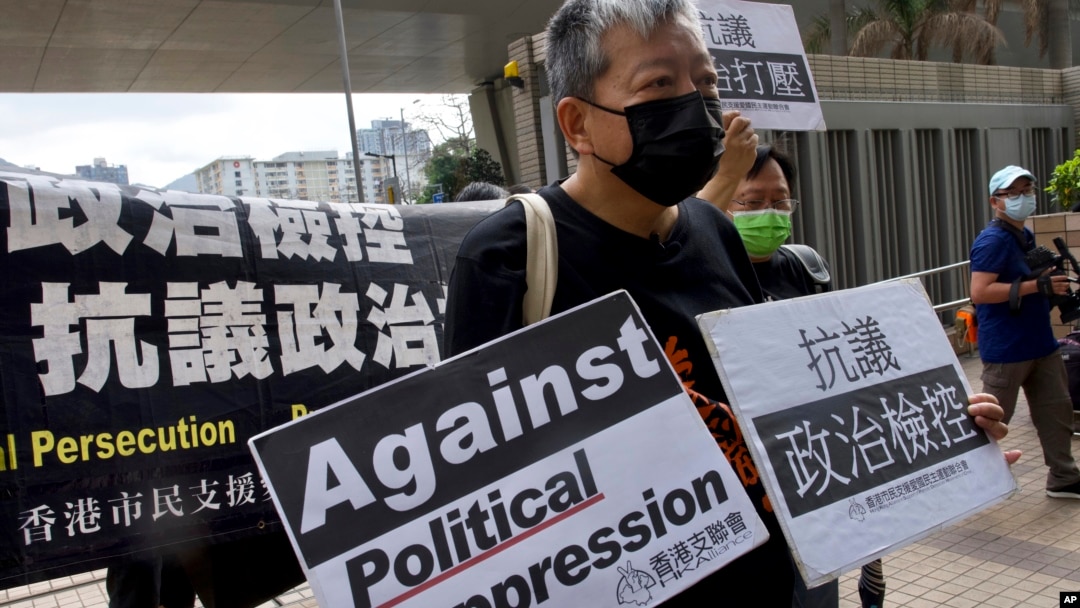Hong Kong’s national security police Thursday arrested veteran labor rights activist Elizabeth Tang after she visited her husband, a prominent former opposition lawmaker, in prison.
Tang, who co-founded the pro-democracy Confederation of Trade Unions with her husband, Lee Cheuk-yan, in 1990, was taken away Thursday afternoon by national security officers outside the Stanley prison, where Lee was detained, Hong Kong media reported.
The reason for her arrest was not immediately clear, although some media reports cited sources as saying Tang is suspected of “colluding with foreign forces,” an offense under a sweeping national security law passed in June 2020.
The law, imposed by China to stamp out the monthslong, sometimes violent anti-government protests that started in 2019, codifies penalties as severe as life imprisonment for crimes including secession, subversion, terrorism and collusion with foreign forces.
SEE ALSO: Top Chinese Official Tells Hong Kong to Nip National Security Risks in the BudTang is currently the general secretary of the International Domestic Workers Federation - a global organization of domestic workers. She had just returned to Hong Kong from Britain. She fled there in September 2021 after a group she headed was suspected of having received more than $12.7 million in donations from organizations in the United States, Germany and Norway since 1994 to support labor movements in Asia, according to the South China Morning Post.
Several media reports identify the group as the Asia Monitor Resource Centre. The organization’s website says it was an independent nongovernmental organization founded in Hong Kong in 1976 to support a democratic and independent labor movement in Asia.
The group announced its closure on its Facebook in September 2021, after it was accused by Beijing-backed media of receiving foreign funds and “acting as a foreign agent” and “colluding” with foreign forces. The group denied the accusation, insisting it was “a civil society organization independent of any local or international organizations.”
The Confederation of Trade Unions, Hong Kong's largest opposition trade union coalition, also dissolved in 2021 after several members received messages threatening their safety.
The closures came amid a spate of police investigations into pro-democracy civil groups. More than 50 civil groups including unions, rights groups, independent media outlets and political parties have closed after the launch of the national security law, which China has insisted was necessary to restore order after the protracted protests in 2019.
The Asia Monitor Resource Centre said on Facebook in January that it has moved to Korea.
Tang’s husband, Lee Cheuk-yan, 66, was a prominent pro-democracy lawmaker and a veteran labor activist. Lee, who went to Beijing to support students and activists in the Tiananmen pro-democracy movement in 1989, was detained for three days before being released.
He is now in jail for unlawful assembly and other offenses. Lee was jailed for 20 months over his involvement in three unauthorized rallies during the 2019 anti-government protests. The prison sentence also covers a fourth instance related to a banned June 4 candlelight vigil in 2020 to mark the anniversary of the 1989 Tiananmen Square crackdown.
He was also charged in 2021 with “inciting subversion” as a leader of the now-disbanded Hong Kong Alliance in Support of Patriotic Democratic Movements of China – the group that organized the city’s annual June 4 Tiananmen Square vigil for 30 years. The alliance’s vice-chairman, Albert Ho, and vice-chairwoman, Chow Hang-tung, were also charged with incitement to subversion.
Lee had been denied bail on the grounds that his wife and family had left Hong Kong.
On Monday, the United Nations Committee on Economic, Social and Cultural Rights urged Chinese and Hong Kong authorities to review the national security law and expressed concern over a trade union ordinance which it said had been used to "hamper the exercise of the rights to freely form trade unions."


